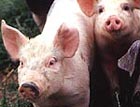Pannage Season
Hundreds of pigs will be released into the New Forest this Saturday, as Pannage Season gets underway. Jonathan Gerrelli, New Forest head agister explains the merits of this age-old custom.


Exquisite houses, the beauty of Nature, and how to get the most from your life, straight to your inbox.
You are now subscribed
Your newsletter sign-up was successful
Autumn in the New Forest has long been associated with pigs. Each September inhabitants of the forest exercise an age-old right of letting their pigs roam freely amongst the trees for a fee of just £1. But pannage, as this ancient practice is known, is not simply a ceremony - the New Forest depends on it.
In medieval Britain, Pannage gave certain New Forest landowners (commoners) the chance to fatten their pigs on acorns, crab apples and beach mast before slaughter later in the autumn. The nine week pannage season was originally fixed between 25 September and 22 November. In the 19th century up to 6,000 pigs were turned out into the New Forest but these days it is far fewer ? less than 300 last year.
Pannage Season is no longer fixed; the Forestry Commission arranges the dates each year in accordance with the arrival of autumn. This year Pannage starts on Saturday September 23 and head agister Jonathan Gerrelli hopes there will be a better showing of pigs than in 2005. ?Less people are exercising the right because there is not a lot of money in pigs and they are hard work,? he explains.
But the Right of Mast, as the custom is known, is not only a good way of fattening up pigs but a surviving example of traditional land management in open heath and woodland. New Forest ponies and cattle govern the character and ecology of the forest but in autumn they risk being poisoned by green acorns. ?Certain ponies develop a taste for them and gorge themselves to death,? says Mr Gerrelli. The annual introduction of pigs, a species unaffected by eating acorns, helps prevent unnecessary deaths. ?This year there is a glut of acorns,? Mr Gerrelli explains, ?So hopefully more pigs will be let out.?
New Forest officials hope the current fashion for organic, locally produced food will help bolster the dwindling New Forest pork market as well as the declining Right of Mast. ?If commoners can buy the pigs cheaply enough and sell them at Salisbury market or other farmers? markets in time for Christmas they will be able to make money. People like to source food locally and you can?t get much more organic than a New Forest pig.?
Exquisite houses, the beauty of Nature, and how to get the most from your life, straight to your inbox.
Country Life is unlike any other magazine: the only glossy weekly on the newsstand and the only magazine that has been guest-edited by His Majesty The King not once, but twice. It is a celebration of modern rural life and all its diverse joys and pleasures — that was first published in Queen Victoria's Diamond Jubilee year. Our eclectic mixture of witty and informative content — from the most up-to-date property news and commentary and a coveted glimpse inside some of the UK's best houses and gardens, to gardening, the arts and interior design, written by experts in their field — still cannot be found in print or online, anywhere else.
